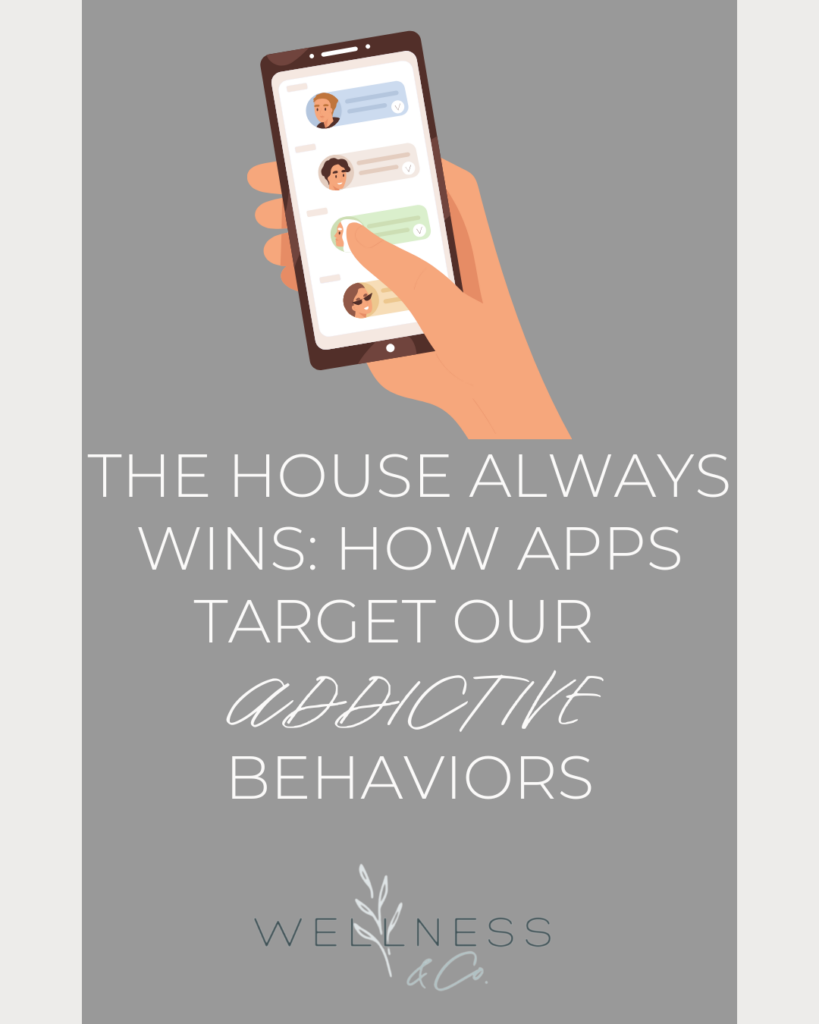Follow
Wellness & Co.
Hi, I'm Dr. K, Wellness & Co. is a growing therapy/coaching practice and educational hub for prospective clients based in Maryland and virtual clients all over the world!
Hi, I'm Dr. K
free guide
e -books
e -course
The House Always Wins: How Apps Target Our Addictive Behaviors
December 3, 2024
By: Kyle Turner, LGPC
READING TIME: 5 MINUTES

Online gambling is a multi-billion dollar industry, made increasingly more accessible by apps and websites that streamline the betting process into a series of simple taps. While many see online gambling as a harmless time-killer, these platforms employ sinister psychological tricks to keep you engaged and spending money.
How Online Gambling Gets in Your Head
The tactics used by online gambling sites and apps are designed to exploit our innate psychological vulnerabilities.

Here are some key strategies that keep you hooked:
1. Variable Rewards (Intermittent Reinforcement): The randomness of gambling outcomes plays a crucial role in keeping players engaged. Known as intermittent reinforcement, this powerful motivator ensures rewards are unpredictable and surprising, making each bet feel like it could be “the one.” B.F. Skinner’s research showed that behaviors reinforced on a variable schedule are more resistant to extinction than those on a fixed schedule (Skinner, 1953). These players often continue betting because the next big win always seems just around the corner (Clark, 2010). In other words, people aren’t addicted to poker or sports betting, they’re addicted to hope.
2. Near-Misses: Online gambling platforms often use near-miss outcomes to encourage players to keep trying. A near-miss occurs when you almost win (e.g., two matching symbols out of three on a slot machine), triggering brain regions associated with rewards (Kassinove & Schare, 2001). These events create the illusion that you were “unlucky” this time, driving you to bet again in hopes of a real win (Clark et al., 2014). The reality of the situation, however, is that you’re likely no closer to a big payout than you were when you started.
3. Losses Disguised as Wins (LDWs): Some gambling apps present losing bets as small wins. For example, a player might wager $5 and win $3, resulting in a net loss, but the app still displays celebratory animations to create the illusion of winning (Dixon et al., 2014). This trick conditions players to associate the experience with positive outcomes, despite actually losing money.
4. Escalating Bets and Progressive Betting Systems: Online casinos often start with low minimum bets to attract new players, then encourage larger bets with special bonuses or promotions. As players get used to higher stakes, their risk tolerance increases, making it easier to continue placing bigger bets (Griffiths, 1999). I’ve had several clients fall prey to this particular tactic, and none of them realized what was happening until they were already deep in a financial hole.
The Rise of Sports Betting: A Different Kind of Hook
Sports betting is becoming increasingly popular, especially with the legalization of online sports gambling in many areas. Although it may seem like a more skill-based form of gambling, sports betting uses the same manipulative techniques as casinos.

1. In-Game Betting and Micro-Bets: Sports betting apps often offer in-game betting options, allowing users to bet on events within the game, such as the next goal or number of fouls in a quarter. This increases betting opportunities within a single event, encouraging repeated bets and prolonged engagement (Killick & Griffiths, 2020). The fast-paced nature of in-game betting can lead to impulsive decision-making, making it easier to fall into harmful gambling patterns.
2. Emotional Manipulation Through Team Loyalty: Everyone loves cheering for their favorite team, but even hometown spirit can be leveraged for Sports betting companies exploit this attachment by offering promotions or “boosted odds” for popular teams, knowing fans are more likely to bet emotionally rather than logically (Ladouceur et al., 2001). When people bet on their favorite teams, it can cloud their judgment, leading to riskier betting behaviors.
3. Promotional Offers and “Risk-Free” Bets: Many sports betting apps lure new users with bonuses like free bets or “risk-free” first bets. While these may sound like great deals, they often come with conditions, such as needing to place a certain number of bets before cashing out. This hooks users into a cycle of betting, leading to increased gambling frequency and higher spending over time (Hing et al., 2018).
How App Developers Are Getting in on the Game
Beyond traditional gambling apps, even non-gambling games incorporate gambling-like features to exploit addictive behaviors. Here’s how:
1. Loot Boxes and Microtransactions: Many video games feature “loot boxes” or microtransactions, where players pay for a chance to win random in-game rewards. Research indicates that these features are linked to problem gambling, as they mimic the excitement and uncertainty of traditional gambling (Zendle & Cairns, 2018; Drummond & Sauer, 2018). The thrill of opening a loot box creates a gambling-like experience, even though it’s technically considered a game purchase. So next time you’re about to drop some money on a sweet loot crate in the hopes of a rare item, ask yourself if it’s really that different from playing a game of roulette.
2. Push Notifications: Gambling apps frequently use push notifications to remind players of promotions, free credits, or betting opportunities. These notifications are often timed to catch users during boredom or stress, capitalizing on their emotional state to draw them back into the app. By sending frequent reminders, apps can trigger cravings and increase gambling frequency (King et al., 2020). If you’re trying to cut back on online gambling, disabling push notifications is a great place to start.
3. Freemium Models and Pay-to-Win Schemes: Many free-to-play games use a “freemium” model, where players can pay for in-game advantages or premium content. These purchases can escalate, as players feel compelled to keep spending to maintain progress. This approach leverages the sunk cost fallacy, where people continue investing because they’ve already spent time or money (King & Delfabbro, 2019).
What You Can Do About It
Being aware of these manipulative techniques can help you make more informed choices about gambling. If you notice you’re spending more time or money than intended, consider setting strict time and spending limits, seeking help, or using apps that block gambling sites. Organizations like Gamblers Anonymous and therapy services can provide support for those struggling with gambling addiction. We also have several members on staff here at Wellness & Co. who have experience navigating gambling addiction.
The world of online gambling and gaming is designed to keep you engaged, but recognizing these tactics can empower you to take control and ensure that – for once – the house doesn’t win.
Be with you again soon,
Kyle
**References**
– Clark, L. (2010). Decision-making during gambling: An integration of cognitive and psychobiological approaches. *Philosophical Transactions of the Royal Society B: Biological Sciences*, 365(1538), 319-330.
– Clark, L., Lawrence, A. J., Astley-Jones, F., & Gray, N. (2014). Gambling near-misses enhance motivation to gamble and recruit win-related brain circuitry. *Neuron*, 61(3), 481-490.
– Dixon, M. J., Harrigan, K. A., Sandhu, R., Collins, K., & Fugelsang, J. A. (2014). Losses disguised as wins in modern multi-line video slot machines. *Addiction*, 109(11), 1925-1933.
– Drummond, A., & Sauer, J. D. (2018). Video game loot boxes are psychologically akin to gambling. *Nature Human Behaviour*, 2(8), 530-532.
– Griffiths, M. (1999). Gambling technologies: Prospects for problem gambling. *Journal of Gambling Studies*, 15(3), 265-283.
– Hing, N., Russell, A. M. T., & Browne, M. (2018). Risk factors for gambling problems on online electronic gaming machines, race betting, and sports betting. *Frontiers in Psychology*, 8, 779.
– Kassinove, J. I., & Schare, M. L. (2001). Effects of the “near miss” and the “big win” on persistence at slot machine gambling. *Psychology of Addictive Behaviors*, 15(2), 155-158.
– Killick, E. A., & Griffiths, M. D. (2020). In-play sports betting: A scoping study. *International Journal of Mental Health and Addiction*, 18, 1230-1253.
– King, D. L., & Delfabbro, P. H. (2019). Video game monetization (e.g., ‘loot boxes’): A blueprint for practical social responsibility measures. *International Journal of Mental Health and Addiction*, 17(1), 166-179.
– King, D. L., Delfabbro, P. H., & Griffiths, M. D. (2020). The convergence of gambling and digital media: Implications for gambling in young people. *Journal of Gambling Studies*, 36(3), 853-876.
– Ladouceur, R., Sévigny, S., Blaszczynski, A., O’Connor, K., & Lavoie, M. E. (2001). Video lottery: Winning expectancies and arousal. *Addictive Behaviors*, 26(4), 531-537.
– Skinner, B. F. (1953). *Science and Human Behavior*. New York: Macmillan.
– Zendle, D., & Cairns, P. (2018). Video game loot boxes are linked to problem gambling: Results of a large-scale survey. *PLOS ONE*, 13(11), e0206767.
Kyle is a licensed graduate professional counselor living in the Towson area. He combines practical distress tolerance, mindfulness, and grounding techniques with a liberal dose of existentialism and emotion focused therapy. Kyle is currently practicing at Wellness and Co.
Leave a Reply Cancel reply
CONTACT
Start Here
BLOG
OUR TEAM
SHOP
ABOUT
©2025 Wellness & Co. | All Rights Reserved | Design by EverMint Design Studio
BACK TO TOP
connect with us on instagram
